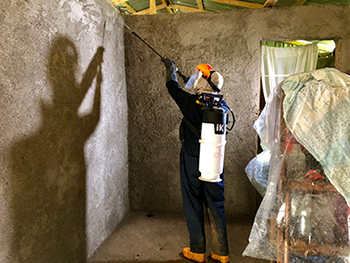You are here
World Malaria Day 2019: Combating this deadly disease
Today we recognize World Malaria Day to help raise awareness of malaria, a deadly, yet preventable disease. Malaria is caused by a parasite that is transmitted to people through the bites of infected mosquitoes.
Since 2000, the world has made remarkable progress in reducing the total number of malaria cases and deaths. But the toll of malaria remains unacceptably high. According to the World Health Organization (WHO), every two minutes, a child dies of this preventable and treatable disease. And each year, more than 200 million new cases of the disease are reported.
WHO’s latest World Malaria Report shows that progress has levelled off, and in some countries malaria is on the rise.
The CDC Foundation has two exciting programs aimed at eliminating malaria.
Malaria Zero is a CDC led alliance of partners with the goal to eliminate malaria from the island of Hispaniola. As part of this work supported by the Bill and Melinda Gates Foundation, Malaria Zero is working with Haiti’s Ministry of Health and Population to increase testing, treating and tracking of malaria cases, with expanding efforts underway in hard-hit rural areas.
 The alliance recently completed a pilot package of interventions aimed at accelerating malaria elimination in five communes of the Grand Anse Department of Haiti, a hard to reach region in southwestern Haiti that carries more than 50 percent of the island nation’s malaria burden. The evidence-based interventions for this pilot included strengthening malaria surveillance, improving access to testing and treatment, and in the highest burden areas, highly targeted mass drug administration and indoor residual spraying of insecticide.
The alliance recently completed a pilot package of interventions aimed at accelerating malaria elimination in five communes of the Grand Anse Department of Haiti, a hard to reach region in southwestern Haiti that carries more than 50 percent of the island nation’s malaria burden. The evidence-based interventions for this pilot included strengthening malaria surveillance, improving access to testing and treatment, and in the highest burden areas, highly targeted mass drug administration and indoor residual spraying of insecticide.
Implementing this pilot was no small feat. More than 130 community members and campaign workers walked many miles across mountainous terrain to administer anti-malaria medication to over 36,000 individuals as part of the malaria elimination efforts.
The impact has been dramatic. A survey showed that transmission has fallen significantly in the pilot implementation area, and Malaria Zero support to health system strengthening nationally might be linked to a potential 50 percent reduction in malaria cases nationwide. Based on this success, Malaria Zero is starting to expand the interventions to the remaining districts in Grand’Anse.
In another collaborative effort, the CDC Foundation is working with CDC, WHO and other partners to support the Malaria Vaccine Implementation Programme (MVIP), specifically in Kenya (alongside Ghana and Malawi). On Tuesday, April 23 Malawi became the first country in the world to provide the malaria vaccine to young children through routine immunization. RTS,S is the world’s first malaria vaccine shown to provide partial protection against malaria in young children in large-scale clinical testing. The vaccine acts against Plasmodium falciparum, the most deadly malaria parasite. Through MVIP, the malaria vaccine will be introduced in selected areas of Kenya and will be made available to children up to two years of age through country-led routine immunization with technical advice from WHO. Through this effort, the CDC Foundation is supporting CDC and other partners to evaluate the feasibility, impact, and safety of the RTS,S malaria vaccine.
We are extremely grateful to our donors and partners for their commitment and support of these programs. We know that working together our impact is greater, and the opportunity to eradicate malaria is within reach.

